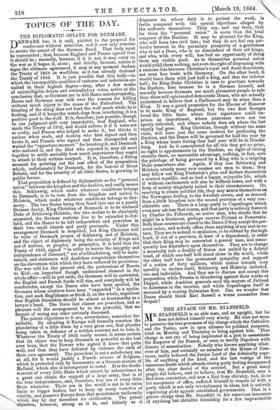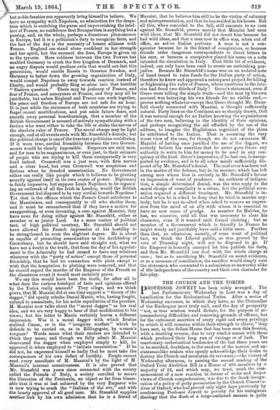THE ATTACK ON MR. STANSFELD.
MR. STANSFELD is an able man, and an upright, but he does not defend himself very wisely. He does not seem to perceive the true gravamen of the charge which the Catholics and the Tories, now in open alliance for political purposes, tried on Monday and Thursday to bring against him. That charge is not one of being implicated in a plot to assassinate the Emperor of the French, or even to terrify Napoleon with threats of assassination. Nobody who knows anything what- ever of him, and certainly no member of the House of Com- mons, really believed the Junior Lord of the Admiralty -capa- ble of anything of the kind, and the last vestige of the rancorous doubt which attends strong party feeling disappeared after the clear denial of the accused. But a great many people did believe, and do believe, that Mr. Stansfeld, once a Red from conviction, and now a Red from chivalry, had, siece his acceptance of office, suffered himself to remain lie with a party which is not only revolutionary in ideas, but is actively organizing plots against established governments. That is a graver charge than Mr. Stansfeld in his conscious innocence of anything but chivalric friendship for a few impracticable but noble fanatics can apparently bring himself to believe. We have no sympathy with Napoleon, no admiration for the despo- tism which is enriching the purse and impoverishing the intel- lect of France, no confidence that Bonapartism is anything but a passing, and, on the whole, perhaps a disastrous phenomenon in Europe, but it is a politician's duty to recognize facts, and the fact of the day is the necessity of honest alliance with France. England can stand alone confident in her strength and her spirit, but the moment she does, Europe is given up to the tyranta. Mere coldness between the two Powers has enabled Germany to crush the free kingdom of Denmark, and an angry dispute would produce evils that would out-last this generation, would enable Russia to threaten Sweden, and Germany to batter down the growing organization of Italy, would compel Napoleon to sway towards reaction instead of liberty, and would probably fling us alone into that horrible -li Eastern question." There may be jealousy of France, and fear of France, and annoyance at France, and they may all be justifiable, but unless England and France can work together, the peace and freedom of Europe are not safe for an hour. It is.just while the statesmen of both countries are trying to forget recent mortifications, and put aside future fears, and smooth away personal heartburnings, that a member of the British Government is accused of actively sympathizing with a faction who want either to take the life or shake the nerves of the absolute ruler of France. The moral charge may be light enough, and at all events ends with Mr. Stansfeld's denials ; but the political charge is one of the heaviest a politician couldbring. If it were true, cordial friendship between the two Govern- ments would be clearly impossible. Emperors are only men, and for men to be magnanimous, or even just, in their estimate of people who are trying to kill them unexpectedly is very hard indeed. Cromwell was a just man, with firm nerves and a clear head, but even Cromwell was suspicious and furious when he dreaded assassination. No Government either can really like people which it believes to be plotting secretly against itself in its own centre of power. Diplomacy is fairly impassive, but suppose Louis Napoleon to be organiz- ing an outbreak of all the Irish in London, would the British Government feel disposed to be very cordial towards Napoleon ? Yet that is the offence which the French Court attributes to the Mazzinians, and consequently to all who shelter them, and it must be remembered that if they have a motive for exaggerating, or even inventing, a case against Mazzini, they have none for doing either against Mr. Stansfeld, either as member or as junior Lord. As a mere' matter of political tact, of high political courtesy, Mr. Stansfeld should not have allowed the French impression of his hostility to be strengthened in even the slightest degree. He is about as capable of promoting assassination as the Archbishop of Canterbury, but he should have said straight out, what we have not a doubt is the truth, that from the day of his appoint- ment to the Admiralty he had ceased to have any relations whatever with the "party of action" except those of personal friendship, that he had no connection with plots except to wish that the temptation to plotting were removed, and that he should regard the murder of the Emperor of the French as the disastrous event it would most certainly prove.
We say this would have been the truth, for after all to what does the curious hotchpot of facts and opinions offered by the Tories really amount? They allege, and we think prove, that M. Mazzini did at one time support a " theory of the dagger," did openly rebuke. Daniel Manin, who, having fought, refused. to assassinate, for his noble repudiation of the practice. M. Mazzini now talks about the " moral dagger " as his real idea, and we are very happy to hear of that modification to his views; but his letter to Manin certainly leaves a different impression. Was it a moral dagger with which Brutus stabbed Crew, or is the " irregular warfare" which he -defends to be carried on, as in Billingsgate, by women's tongues? Words mean what their readers are intended to -think they mean, and though we fully admit M. Mazzini .denouuced the dagger when employed simply to kill, he -approved it when employed to "initiate insurrection." If he -did net, he expressed himself so badly that he must take the -consequences of his own defect of lucidity. People cannot -read every manifesto of M. Mazzini's by the light of M. Mazzini's internal consciousness. It is also proved that Mr.. Stansfeld was years since connected with the society called the Friends of Italy, a society enrolled to secure -the liberation of the Peninsula, an object so far from blame- able that it was at last achieved by the very Emperor who is now trying to crush the "Italians of the eve," and with the hearty approval of all good men. Mr. Stansfeld supplies another link by his own admission that he is a friend of
Afazzini, that he believes him still to be the victim of calumny and misrepresentation, and that ho has resided in his house. But all this, when conceded to the full, still amounts to no case against Mr. Stansfeld, proves merely that Mazzini had once wild ideas, that Mr. Stansfeld did not desert him because he had wild ideas, and that a man now in office was, when out of office, an active Italian partizan. A. man is not a con- spirator because he is the friend of conspirators, or because friends order dangerous correspondents to direct letters to his care, or because a conspirator placed his name on a note intended for circulation in Italy. That little bit of evidence, indeed, can only have been used to create an unthinking pre- judice. Because Mr. Stansfeld's name was on an undated note of hand issued to raise funds for the Italian party of action, therefore he knew and approved a subsequent project for killing or frightening the ruler of France, whose exertions in the inte- rim had freed two-thirds of Italy ! Greco's statement, even if Greco were telling the simple truth—and the man by his own account was betraying his own friends for no visible end,— proves nothing whatever except that Greco thought Mr. Stens- feld closely connected with Mazzini, a thought sufficiently natural. Party lines on the Continent are so sharply drawn, that it was natural enough for an Italian knowing the acquaintance of the two men, believing in the identity of their opinions, and perhaps recognizing the aid afforded by the use of the address, to imagine the Englishman cognizant of the plans he attributed to the Italian. That is assuming the very worst view of the case, for though we do not exonerate M. Mazzini of having once justified the use of the dagger, we entirely believe his assertion that he never gave Greco any authority to write to him for money to be used in any con- spiracy of the kind. Greco's impression, if he had one, is unsup- ported by evidence, and is to all sober minds sufficiently dis- posed of by Mr. Stansfeld's denial. The real error.has been not in the matter of the defence, but in its manner, which has left among men whose bias is entirely in Mr. Stansfeld's favour an impression of want of prudence. An outburst of indigna- tion, a simple determined denial, was the wise reply to the moral charge of complicity in a crime, but the political accu- sation required a different treatment. Mr. Stansfeld is in- sulted when he is asked to deny that he tried to murder any- body, but he is not insulted when asked to remove an impres- sion from the mind of an ally with whom it is essential to have no new cause of grudge. As member for Halifax, he has, we conceive, said all that was necessary to clear his character, even if it wanted such formal clearing ; but as member of a Government which is friendly to Franco he might wisely and justifiably have said a little more. Further than that, an admission, namely, of some want of political tact, we think the Liberal public, as was proved by the vote of Thursday night, will not be disposed to go. If the Emperor is honestly annoyed let him publish his facts, and then Mr. Stansfeld can deal with the whole charge at once ; but as to sacrificing Mr. Stansfeld on secret evidence, or as a measure of conciliation, the sacrifice would simply ruin the statesmen who consented to a submission so unworthy alike of the independence of the country and their own character for fair-play.



































 Previous page
Previous page